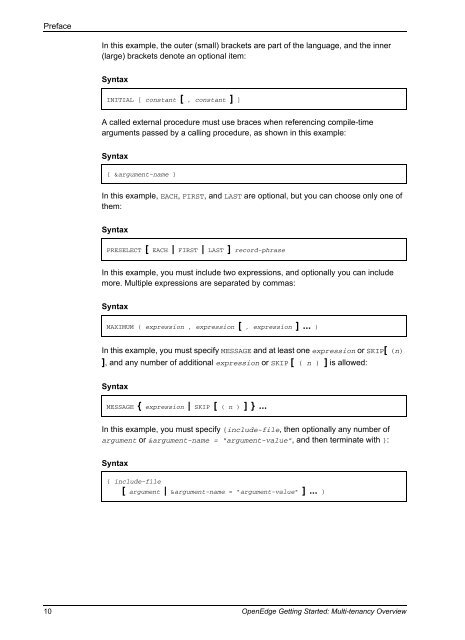OpenEdge Getting Started: Multi-tenancy Overview - Product ...
OpenEdge Getting Started: Multi-tenancy Overview - Product ...
OpenEdge Getting Started: Multi-tenancy Overview - Product ...
You also want an ePaper? Increase the reach of your titles
YUMPU automatically turns print PDFs into web optimized ePapers that Google loves.
Preface<br />
In this example, the outer (small) brackets are part of the language, and the inner<br />
(large) brackets denote an optional item:<br />
Syntax<br />
INITIAL [ constant [ , constant ] ]<br />
A called external procedure must use braces when referencing compile-time<br />
arguments passed by a calling procedure, as shown in this example:<br />
Syntax<br />
{ &argument-name }<br />
In this example, EACH, FIRST, and LAST are optional, but you can choose only one of<br />
them:<br />
Syntax<br />
PRESELECT [ EACH | FIRST | LAST ] record-phrase<br />
In this example, you must include two expressions, and optionally you can include<br />
more. <strong>Multi</strong>ple expressions are separated by commas:<br />
Syntax<br />
MAXIMUM ( expression , expression [ , expression ] ... )<br />
In this example, you must specify MESSAGE and at least one expression or SKIP[ (n)<br />
], and any number of additional expression or SKIP [ ( n ) ] is allowed:<br />
Syntax<br />
MESSAGE { expression | SKIP [ ( n ) ] } ...<br />
In this example, you must specify {include-file, then optionally any number of<br />
argument or &argument-name = "argument-value", and then terminate with }:<br />
Syntax<br />
{ include-file<br />
[ argument | &argument-name = "argument-value" ] ... }<br />
10 <strong>OpenEdge</strong> <strong>Getting</strong> <strong>Started</strong>: <strong>Multi</strong>-<strong>tenancy</strong> <strong>Overview</strong>
















